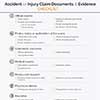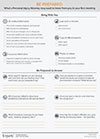
Property losses from hurricanes or other natural disasters can be devastating—both emotionally and financially. Yes, the most important thing in the aftermath of a hurricane is that everyone is safe. But rebuilding a life from the ground up is no small feat.
In general, a personal injury lawsuit requires that the injury or loss was caused by negligence. Negligence can be by a person or entity and is based on a lack of reasonable care to avoid harm. However, you can’t sue Mother Nature. A hurricane, tornado, earthquake, tsunami, or other natural weather occurrence is not caused by a person or entity’s negligence. So who can you sue to receive compensation?
There are a few ways you might have a lawsuit for damage inflicted by a hurricane. First, you might have an insurance claim dispute if your insurer fails to cover your losses. Second, there might be negligence by a third party if their action (or inaction) worsened the effects of the hurricane on others. Third, there could be liability of a government agency if the storm causes infrastructure damage that should have been avoided. Finally, there could be a product liability claim if your property was damaged by faulty goods.
Insurance claim disputes
Denial or underpayment of claims
If you have homeowner’s or property insurance that covers hurricane damage, but your claim is wrongfully denied, delayed, or underpaid, you can file a lawsuit against the insurance company for bad faith practices. This involves the insurer not acting in good faith to fulfill the terms of the policy.
Interpretation of Policy Coverage
Disputes often arise over what damage is covered (for example, wind vs. flood damage). If the insurance company unfairly interprets the policy in its favor, you might be able to take legal action to recover full compensation.
Failure to investigate
You can also file a lawsuit if the insurer fails to properly investigate your claim or provide a reasonable explanation for denying it. Bear in mind that in a situation when entire cities or communities have suffered losses, this could take a significant amount of time.
Negligence by a third party
If a person, business, or agency has worsened your financial condition because of negligence in an emergency situation like a hurricane, you might have a cause of action to file a lawsuit.
Construction defects
If a builder or contractor used substandard materials or failed to follow building codes, making your property more vulnerable to hurricane damage, might may have a case for negligence against the contractor or builder.
Tree damage
If a neighbor’s poorly maintained tree fell onto your property during a hurricane, causing damage, you might be able to file a lawsuit against the neighbor for negligence, especially if they knew the tree posed a hazard.
Failure to secure property
Businesses, construction sites, or others that failed to secure equipment, materials, or structures that then caused damage during the hurricane may be liable.
Government liability
Flooding because of poor infrastructure
In rare cases, if property damage is caused by the government’s failure to maintain infrastructure (like faulty storm drainage systems or inadequate flood protection measures), you might be able to file a claim against the government. These cases can be challenging due to sovereign immunity, but exceptions could apply.
Zoning or permitting issues
If local governments allowed improper development in flood-prone areas or failed to enforce building codes, they could potentially be held responsible for damage.
Product liability
If your property damage was caused by defective materials or systems (for instance, roofing materials that failed despite being rated for hurricane winds), you may be able to file a product liability lawsuit against the manufacturer or supplier.
What should you do if you’ve suffered hurricane damage and might consider a lawsuit?
- Review your insurance policy.
Be sure to understand the coverage provided for hurricane-related damage, including any exclusions or limits (e.g., flood vs. wind damage). - Document with notes and photos.
Take photos and videos of the damage and keep detailed records of any expenses related to repairs, temporary accommodations, and loss of personal property. - File your claim promptly.
Report the damage to your insurance company as soon as possible and follow their procedures for filing a claim. The statute of limitations for most civil claims is two years, but that only refers to lawsuits. Each insurance company may set its own time frame for when a claim must be filed, and you need to pay attention and work within its limits. - Seek guidance from an attorney.
You can file a lawsuit for property damage caused by a hurricane in certain situations, especially if your insurance company acts in bad faith or if third-party negligence contributed to the damage. Before filing a lawsuit, it’s important to explore all available options, including insurance claims and negotiating with your insurer. If your claim is denied or you believe you have grounds for a lawsuit due to negligence, consult with a property damage or insurance attorney who can advise you on the best course of action.

Checklist of 30 items to help you prepare for making a personal injury or accident claim
Download in PDF format

A worksheet to prepare for your first meeting with a personal injury attorney – what to bring, what they'll ask
Download in PDF format
